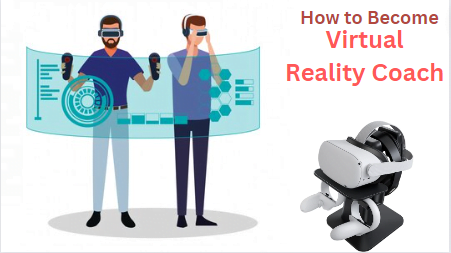Virtual reality training has emerged as a powerful tool in various industries, from healthcare and aviation to education and entertainment.
If you’re passionate about technology and eager to help others learn and grow, becoming a virtual reality coach might be the perfect career for you.
In this guide, we’ll explore the ins and outs of virtual reality coaching, including the skills, qualifications, and steps you need to take to succeed in this exciting field.
What Is Virtual Reality Coaching
Virtual reality coaching involves using virtual reality (VR) technology to deliver immersive, interactive, and realistic training experiences. As a virtual reality coach, you’ll guide learners through these virtual environments, offering support, feedback, and instruction to help them acquire new skills and knowledge more effectively and efficiently.
Types Of Virtual Reality Coaches
There are various types of virtual reality coaches, each specializing in different industries or applications of VR technology. Some common types of virtual reality trainers include:
- Medical and healthcare VR coaches: Focus on training medical professionals through simulated scenarios, such as surgeries or patient care.
- Aviation and aerospace VR coaches: Train pilots and crew members using realistic flight simulators and virtual environments.
- Corporate and industrial VR coaches: Provide immersive training experiences for employees in various industries, such as manufacturing, construction, or safety.
- Educational VR coaches: Use VR technology to enhance learning experiences in schools, universities, and professional development programs.
Roles and Responsibilities of a Virtual Reality Coach
A virtual reality coach is responsible for a wide range of tasks, including:
- Developing and implementing VR training programs
- Guiding learners through virtual environments and scenarios
- Monitoring progress and providing constructive feedback
- Adjusting training sessions based on individual learner needs
- Maintaining and updating virtual reality training software and equipment
Skills Required to Become a Virtual Reality Coach
To excel as a virtual reality trainer, you’ll need a unique blend of skills, including:
- Technical proficiency: Familiarity with VR hardware, software, and development tools
- Instructional design: Ability to create engaging, effective, and immersive VR training experiences
- Communication and interpersonal skills: Ability to connect with learners and provide clear, concise guidance
- Adaptability and problem-solving: Capability to address technical issues and tailor training sessions to individual needs
Virtual Reality Coach Requirements
Requirements for becoming a virtual reality trainer may vary depending on the industry and specific job. However, some common prerequisites include:
- A bachelor’s degree or higher in a relevant field, such as education, instructional design, or computer science
- Experience with virtual reality technology, including hardware and software
- Familiarity with instructional design principles and techniques
- Strong communication and interpersonal skills
Virtual Reality Coach Qualification
While there is no standard qualification for virtual reality trainers, obtaining certifications or completing relevant courses can boost your credibility and expertise.
Consider pursuing a certification in virtual reality, instructional design, or a related field to demonstrate your knowledge and commitment to the profession.
Also Read: How to become a Bartender
How To Become A Virtual Reality Coach: A Step-By-Step Guide
- Obtain a relevant degree in education, instructional design, computer science, or a related field.
- Gain experience with virtual reality technology, including hardware, software, and development tools.
- Develop your instructional design skills and knowledge of learning principles.
- Pursue relevant certifications or courses to enhance your expertise and credibility.
- Build a strong portfolio showcasing your VR training projects and accomplishments.
- Network with professionals in the VR training industry and apply for virtual reality coaching positions.
Virtual Reality Coach Salary
The salary of a virtual reality coach can vary depending on factors such as experience, industry, location, and employer.
According to available data, the average salary range for a virtual reality coach is between $45,000 and $85,000 per year.
Keep in mind that these figures can vary significantly, and additional factors such as certifications or specialized expertise may impact your earning potential.
Life of a Virtual Reality Coach
The life of a virtual reality coach is dynamic and rewarding, offering opportunities to work with cutting-edge technology and make a lasting impact on learners.
Your work environment may vary, from traditional classrooms and training centers to remote or online settings.
As a virtual reality coach, you’ll constantly adapt to new technologies, learning methodologies, and industry trends, ensuring a challenging and engaging career.
Pros & Cons
Pros:
- Opportunity to work with innovative technology
- Diverse range of industries and applications
- High demand for VR training expertise
- Chance to make a meaningful impact on learners
Cons:
- Rapidly evolving technology requires ongoing learning
- Initial investment in education and certifications may be required
- Potential for long hours and high-pressure situations
- Competition for specialized virtual reality coaching positions
Summary
Becoming a virtual reality coach is an exciting and rewarding career path for those passionate about technology and education.
By following the steps outlined in this guide and continually developing your skills and expertise, you’ll be well on your way to a thriving career in the growing field of virtual reality training.
As you embark on this journey, remember that the key to success as a virtual reality coach lies in your ability to adapt, learn, and maintain a genuine enthusiasm for helping others achieve their goals.
FAQs
How expensive is VR for training?
VR training costs vary depending on hardware, software, and development expenses, but can be a cost-effective solution in the long run.
How long does it take to learn VR?
Learning VR depends on individual abilities and goals; basic familiarity takes weeks, while mastering development may take months or years.
Is VR in high demand?
VR is in high demand across industries, including healthcare, aviation, education, and entertainment, due to its immersive and engaging nature.
Is VR a good career?
VR is a promising career, offering diverse opportunities, growth potential, and the chance to work with cutting-edge technology.
